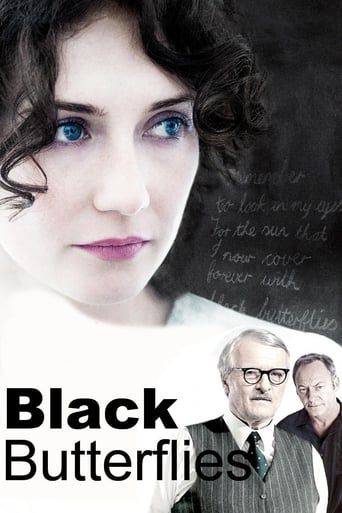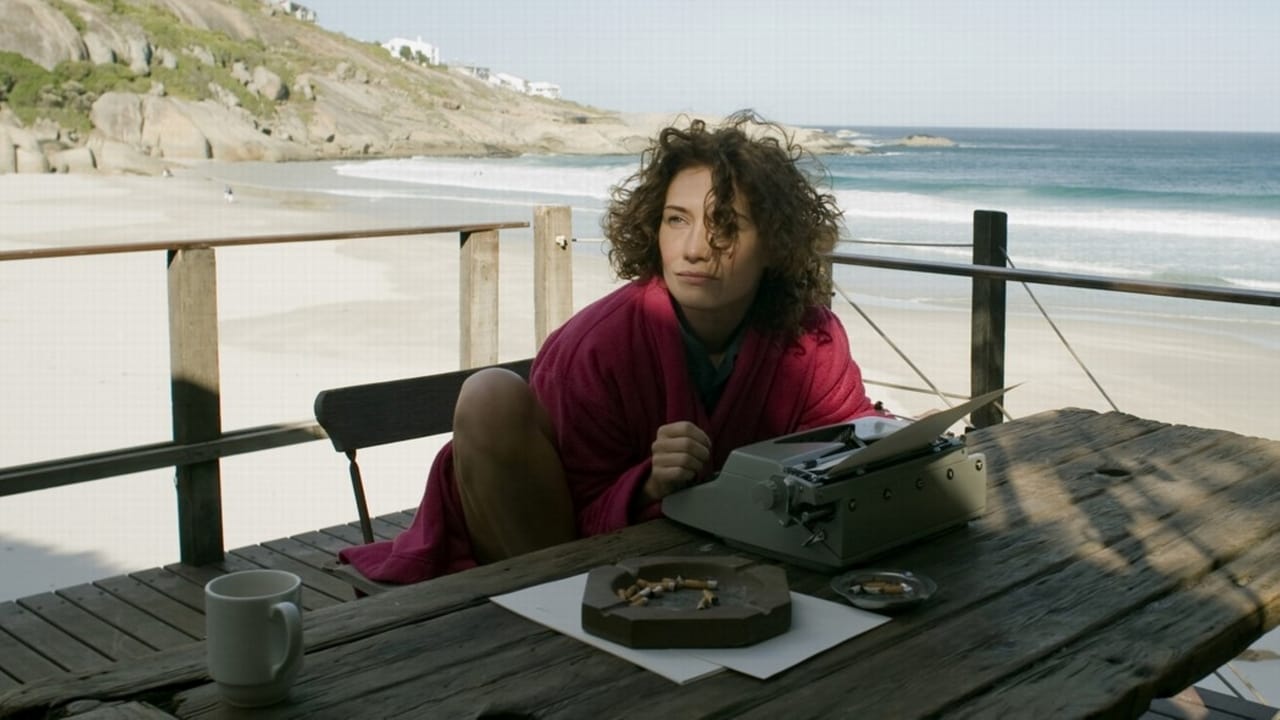chuckchuck21
Black Butterflies, a picture of the life of Ingrid Jonker (Carice van Houten) in South Africa during the years of Apartheid is a movie that leaves many impressions. She was a poet & the daughter of a South African MP or representative of an electoral district. Born to privilege, her mother died in an asylum she herself would later be admitted to herself. She showed signs of mental illness all her life & spent many of her days self medicating with sex & alcohol. Yet her talent with words is well documented in her poems.Being in conflict with her father's political beliefs she suffered an estrangement from him even when in the same room. It is well known that daughters who fail to receive the love they need from living fathers often turn to other men for love & approval. Sex, being the mechanism they try to use to obtain that that they lacked growing up, creating unstable relationships in their adult life too. They become a burden to those around them & not the first person you'd seek as a friend. Her choices as an adult leave a lot to be desired. Even her own daughter who she chose to leave motherless was used more as a crutch than an object of love & responsibility.She lived a life of mental turmoil in a country of extreme prejudice & hated that inequality. Unable to forget or assuage the pain of her circumstances, that pain grew over the years to choke her. Yet she became the voice of those that were declared less than human by her father's beliefs. A poem of hers was read at the first democratically elected South African Congress. It begins, "The child is not dead" She took her own life after having withstood all the pain & confusion she could in this life & that will always be controversial in this world. Who is to judge how a person that retains constant contact with mental agony so that it builds in them year by year with little or no relief is to be seen? We call those that overcome such circumstances heroes & hope we are like them. Yet those that see the inequities in this world & summarily reject such things for themselves while seeing them clear enough to describe them in verse, having those things enter their mind through their eyes on a daily basis, what can we say of them. Ingrid was a load to carry if you knew her & quite frankly I'm glad I didn't. I'm no fan of suicide either but I find more sorrow than condemnation in her passing. It is for certain that the people of a South Africa free of Apartheid see her as worthy of praise.Carice van Houten is excellent in portraying a life made of & lived by confusion. Rutger Hauer as her father & Liam Cunningham as her main love in life are strong in their roles as well. There is little in this movie that is shot as pretty or engaging scenery with the exception of the ocean. It's not intended to be pretty either in appearance or portrayal. Nudity is included but it is tastefully done. I was tempted to turn this off early on while they were displaying Ingrid's choices in life. It was a difficult watch to get through because of my dislike for her personality & life but I was glad I hung in till the end. I give it 4 out of 5 Amazon stars overall. 5 out of 5 for making me think through my reactions to it.It only rates 6.2 at IMDb but I think a lot of people quit on this one & rated it anyway.
Some Dude
It would be extremely useful if IMDb were to actually mention this on the movie's page somewhere.If you are not from South Africa, you've probably never heard of this poetess from that Aparathied era. Unfortunately, this movie is unlikely to make you want to learn any more about her as it portrays her as an extremely unlikable, self-centred, promiscuous abuser of everyone she meets. I have no idea if this is actually how Jonker was in life, and quite frankly this movie makes me not care in the least.I'm sure she must have had some redeeming qualities, but the lacklustre performances and horrible script disguise them well.
p-stepien
"Black Butterflies", a biographical drama imagining the life and times of famed Afrikaner poet Ingrid Jonker (played with a distracting non-afrikaans accent by Carice van Houten), ventures through uneasy territory of a manic-depressive egocentric leech, who happens per chance to also be a brilliant poet. Focused mainly around her tentative affair with acclaimed novelist Jack Cope (Liam Cunningham), it also features subplots regarding her promiscuous behaviour and romance with Eugene Maritz (Nicholas Pauling), de facto a cryptic Andre Brink, and her conflicted relationship with her father Abraham Jonker (Rutger Hauer), who headed the censorship department of the Apartheid government.Through her tribulations (without much trials) the audience in swept into the demented and self-absorbed world of the poet with destructive tendencies and little more than a fleeting regard for anything outside of her own virtual obsessions and hyperbolized melodrama. Director Paula van der Oest and scriptwriter Greg Latter leave little sympathy for Ingrid Jonker, portraying her as compulsive, impulsive, bordering on alcoholic, accusatory in nature, morally repugnant with overwhelming inclinations towards destroying everything around her during her turbulent emotional whirlwinds, including overwhelming contemptuous disregard towards her own child. Nonetheless Ingrid remains fascinating and magnetic as a poet epitomised by her internal contradictions and fragility. If this movie was aimed at being an elegy towards the revered writer, than sadly it has failed. But as a character study of a troubled and turbulent individual, which by teasing brilliance ends up spiralling into despair and manic annihilation, it is a captivating experience.Despite her obvious issues with keeping an accent and the resulting meandering articulation Carice van Houten still manages to convey the obsessive Ingrid with her crippling character disorders. Nonetheless, despite much more limited screen time, she is indiscriminately overshadowed by Liam Cunningham and Rutger Hauer, who come en force in their respective roles. Nonetheless, script-wise the interactions between father and daughter feel dauntlessly underlined, not following through on the key importance of this relationship to Jonker's writings. Filtered through some brilliant cinematography and restrained direction with a touch of poetic artistry, the overall experience was extremely enticing, even if the divisive character of Ingrid Jonker is bound to push all the wrong buttons for many viewers.
anthonydavis26
This review was made for Cambridge Film Festival (UK) - 15 to 25 September 2011* Contains spoilers *As expected, Liam Cunningham (as Jack Cope) was excellent, but Carice van Houten, playing poet Ingrid Jonker, was a revelation. To those in the know, she perfectly carried out a role that betrayed the traits of impetuosity, feeling abandoned, blaming others, promiscuity, drinking too much in order to feel safe and able to cope, and becoming overwhelmed by conflicting emotions, which characterize some common personality disorders (they would probably have called them neuroses then).Yet, as is by no means inconsistent, her character was delightful, and she filled the screen with feeling, from seducing Jack, and showing the characters' hunger for each other in the very beautiful sex-scenes, to hurling objects at him with extreme force. There are claims that she has had other lovers, but Eugene and Jack, the ones who are definite, both find her draining, as well they would. A force for life is hard to live with, after all.Rutger Hauer as Ingrid's father (eerily resembling my former university tutor facially) has a harsh love (eventually, on account of her alleged sleeping around, he dismisses her as a slut), likely to have been one of the things that contributed to how she reacts to life and, through doing so in later life, the three psychiatric admissions that we see (or hear of), the last of them leading to electroconvulsive therapy (ECT). Although it is not always true that people are never the same after it, she is damaged.She is also damaged by the child whom she wished she had kept, and by the one fathered by Eugene, and which led her to desperate steps in Paris and that last admission. Whereas the film does not pretend to portray Ingrid's life or that of others who were close to her faithfully, hearing Carice (and, against his judgement, her character's father) read her verse will encourage a journey to look out her writing, not least given that is was allowed such a prominent place in the new South Africa.Maybe the real Ingrid wrote on the walls, maybe she didn't, but it set up a world in which desperate words written in the condensation in Paris were hurtingly real, and also tragically echoed her having made love to Jack in her old room at her father's house (the old servants' quarters), their bodies touching and mingling with her script.Not exactly a love-story, through she clearly does love Jack (but cannot be 'faithful'), but one about what it is to feel, love and live, and to write faithfully what one believes in, whatever the cost.


 AD
AD



